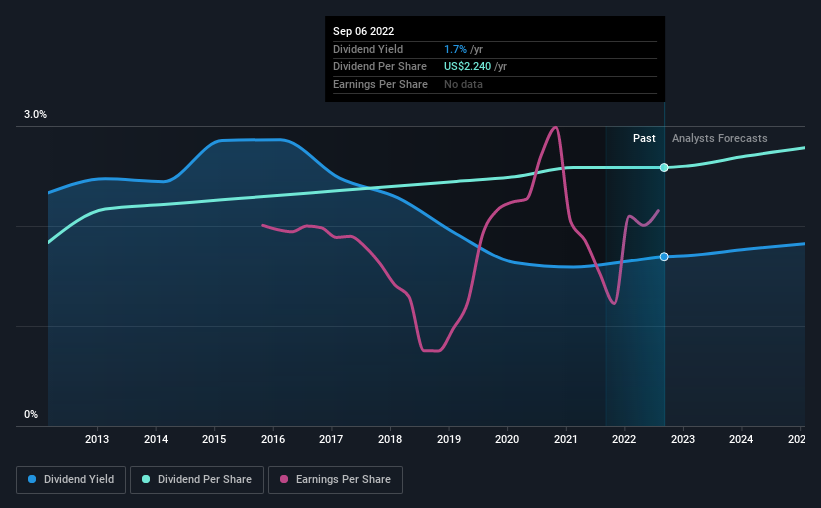- United States
- /
- Food and Staples Retail
- /
- NYSE:WMT
Walmart (NYSE:WMT) Is Increasing Its Dividend To $0.56

Walmart Inc. (NYSE:WMT) has announced that it will be increasing its dividend from last year's comparable payment on the 3rd of January to $0.56. The payment will take the dividend yield to 1.7%, which is in line with the average for the industry.
See our latest analysis for Walmart
Walmart's Earnings Easily Cover The Distributions
Unless the payments are sustainable, the dividend yield doesn't mean too much. Prior to this announcement, Walmart's dividend was only 44% of earnings, however it was paying out 112% of free cash flows. The company might be more focused on returning cash to shareholders, but paying out this much of its cash flow could expose the dividend to being cut in the future.
Over the next year, EPS is forecast to expand by 49.8%. If the dividend continues on this path, the payout ratio could be 30% by next year, which we think can be pretty sustainable going forward.

Walmart Has A Solid Track Record
The company has a sustained record of paying dividends with very little fluctuation. Since 2012, the annual payment back then was $1.59, compared to the most recent full-year payment of $2.24. This means that it has been growing its distributions at 3.5% per annum over that time. Slow and steady dividend growth might not sound that exciting, but dividends have been stable for ten years, which we think makes this a fairly attractive offer.
Walmart May Find It Hard To Grow The Dividend
Investors who have held shares in the company for the past few years will be happy with the dividend income they have received. Earnings has been rising at 4.1% per annum over the last five years, which admittedly is a bit slow. Walmart is struggling to find viable investments, so it is returning more to shareholders. This isn't necessarily bad, but we wouldn't expect rapid dividend growth in the future.
Our Thoughts On Walmart's Dividend
Overall, this is probably not a great income stock, even though the dividend is being raised at the moment. With cash flows lacking, it is difficult to see how the company can sustain a dividend payment. This company is not in the top tier of income providing stocks.
It's important to note that companies having a consistent dividend policy will generate greater investor confidence than those having an erratic one. At the same time, there are other factors our readers should be conscious of before pouring capital into a stock. Taking the debate a bit further, we've identified 1 warning sign for Walmart that investors need to be conscious of moving forward. If you are a dividend investor, you might also want to look at our curated list of high yield dividend stocks.
If you're looking to trade Walmart, open an account with the lowest-cost platform trusted by professionals, Interactive Brokers.
With clients in over 200 countries and territories, and access to 160 markets, IBKR lets you trade stocks, options, futures, forex, bonds and funds from a single integrated account.
Enjoy no hidden fees, no account minimums, and FX conversion rates as low as 0.03%, far better than what most brokers offer.
Sponsored ContentValuation is complex, but we're here to simplify it.
Discover if Walmart might be undervalued or overvalued with our detailed analysis, featuring fair value estimates, potential risks, dividends, insider trades, and its financial condition.
Access Free AnalysisHave feedback on this article? Concerned about the content? Get in touch with us directly. Alternatively, email editorial-team (at) simplywallst.com.
This article by Simply Wall St is general in nature. We provide commentary based on historical data and analyst forecasts only using an unbiased methodology and our articles are not intended to be financial advice. It does not constitute a recommendation to buy or sell any stock, and does not take account of your objectives, or your financial situation. We aim to bring you long-term focused analysis driven by fundamental data. Note that our analysis may not factor in the latest price-sensitive company announcements or qualitative material. Simply Wall St has no position in any stocks mentioned.
About NYSE:WMT
Walmart
Engages in the operation of retail and wholesale stores and clubs, eCommerce websites, and mobile applications worldwide.
Outstanding track record with excellent balance sheet and pays a dividend.
Similar Companies
Market Insights
Community Narratives



